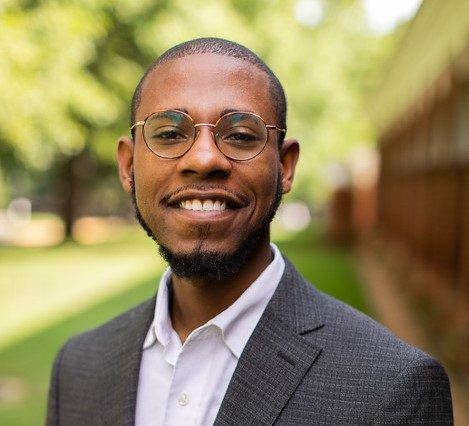The Predoctoral Interdisciplinary Research Training Program in the Education Sciences was established by IES to increase the number of well-trained PhD students who are prepared to conduct rigorous and relevant education research. IES encourages our predoctoral fellows to develop strong writing skills in addition to subject-matter and methodological expertise. In this guest blog, we asked IES predoctoral fellow, Todd Hall, co-chair of the Black Scholars in Education and Human Development Writing Group at the University of Virginia, to discuss how participating in this writing group has helped his development as an education researcher. Todd, is part of the IES-funded Virginia Education Science Training (VEST) program and studies early childhood education policy as well as school discipline in both early childhood and K-12 settings.
 How did you become involved in the Black Scholars in Education and Human Development Writing Group?
How did you become involved in the Black Scholars in Education and Human Development Writing Group?
I started my PhD in education policy in August 2020. The COVID-19 pandemic made networking and simply making friends awkward. During my first week in Charlottesville, VA, I watched wistfully from my window as a Black person jogged past my house. For me, the jogger represented communities of color at UVA that I did not know how to connect with.
Enter Dr. Edward Scott and Dr. Miray Seward, then students and co-chairs of the Black Scholars in Education and Human Development Writing Group. They sent me a personal email invitation to join the group’s first virtual writing retreat. When I joined the Zoom room, I found the affinity space I was looking for. I connected with graduate students whom I later turned to for informal mentorship, course recommendations, tips on navigating the hidden curriculum of grad school, insights from job market experiences, and examples of successful written proposals. The laughs shared virtually during check-ins between writing blocks helped ward off the pandemic blues.
I resolved to pay it forward, so I began shadowing Edward and Miray. When they graduated, I stepped into a leadership role alongside my co-chair, Sasha Miller-Marshall.
How has participating in the writing group helped you develop as a scholar?
The writing group has reminded me that I am not the only one who experiences writer’s block and has provided me with writing process role models. The professional development sessions we host have been one of the few opportunities that I have found to see faculty expose and reflect on their own writing challenges, from protecting their time for writing to incorporating critical feedback. This provides a unique perspective on the writing process—I often see faculty discuss works in progress, but the format is usually an oral presentation with slides rather than something written.
In the Black Scholars Writing Group sessions, speakers often share candidly about their own process, including writer’s block and how they overcome it. For example, a senior faculty member shared that they used voice memos to process their thoughts when they feel stuck. That disclosure normalized my experience of writer’s block and made me feel comfortable sharing that I write memos on my phone when I feel stuck. Moments like these have provided tools to overcome resistance in my writing process and normalized the experience of strategizing about writing rather than expecting words to flow effortlessly.
The presenters who lead sessions with our group have diverse racial/ethnic backgrounds, but the focus of the group on creating affinity space for Black doctoral and PhD students allows me to be less concerned about stereotype threat. Whereas I am often the only Black person in other rooms, I am never the only Black person in this writing group. That alleviates any concern about being perceived as a token representative of Black people, or worse, as less capable if I choose to share my difficulties. In one session, I was able to unpack with the faculty speaker that a particular piece of writing was difficult because I had not yet answered the simple question of why the work was important. I got to that realization because the speaker modeled vulnerability about their own writing process, and I felt at ease to discuss my own.
How can the broader education research community help graduate student researchers develop as writers?
Where appropriate and feasible, education researchers can share their successful conference proposals, grant applications, budgets, reviewer response letters, and perhaps even dissertation chapters. If it does not make sense to post them publicly, researchers could offer to share materials with graduate students that they meet at speaking engagements, conferences, etc.
Successful models have given me helpful guidance, especially when tackling a new format. Beyond the writing group, I am immensely grateful to the alumni of my IES pre-doctoral fellowship who have provided many of their materials for current students to reference.
What advice can you give other student researchers who wish to further develop their writing skills?
Cultivate authentic relationships with a network of mentors who are willing to share examples of their successful writing and review your work. My advisor is amazing and thorough with her feedback. That said, it has been useful to strategically ask others who bring in complementary perspectives to review my work. For example, my advisor is a quantitative researcher, and I recently proposed a mixed methods study. Researchers who do qualitative and mixed methods work were able to challenge and strengthen the qualitative aspects of my proposal based on their expertise. You might also be applying for opportunities or submitting to journals that other mentors have succeeded with or reviewed for. They may help you anticipate what that audience might be looking for.
In addition, when you receive feedback, do so graciously, weigh it seriously, and ask yourself if there’s a broader piece of constructive criticism to apply to your other writing.
This blog was produced training program officer Katina Stapleton (Katina.Stapleton@ed.gov) and is part of a larger series on the IES research training programs.